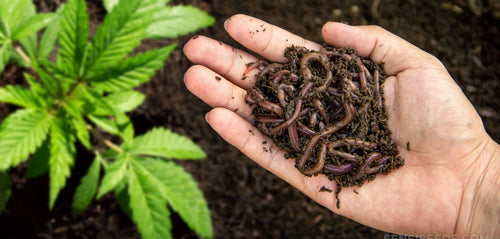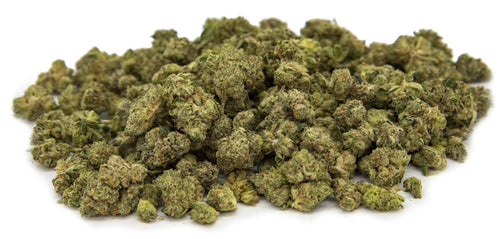#12: Cannabis and Sleep: A Guide to Improving Sleep Quality
#12: Cannabis and Sleep: A Guide to Improving Sleep Quality
There is an old saying that "a good night’s sleep is the best medicine". But if you're one of the millions of people who suffer from sleep disorders, it can be hard to find a reliable form of relief. The average adult requires seven to nine hours of sleep per night, yet almost two-thirds of Canadian adults report having difficulty either initiating or maintaining sleep on a regular basis. This issue is more than just an inconvenience – chronic sleep deprivation can result in negative impacts on physical and mental health, as well as reduced quality of life.
Traditional treatments for insomnia range from prescription or herbal medications to lifestyle modifications such as relaxation techniques or even cognitive-behavioural therapy. Increasingly, however, people are turning to cannabis as an aid to improve their sleep quality. Research suggests that this ancient plant may be able to help with insomnia in a number of ways, including reducing anxiety and pain-related disturbances that can impede restful sleep.
In this article, we'll explore the science behind cannabis and sleep, from the effects of cannabinoids on insomnia to how they can help you enter into REM sleep. We'll also discuss what to consider when using cannabis as a sleep aid, so you can make an informed decision and find the best solution for your individual needs. So let's dive in!
The basics of sleep and its importance

Sleep is a complex process that involves multiple stages. Each stage plays an important role in the overall health and well-being of the body. During sleep, we go through a cycle that begins with light sleep and progresses to deep sleep, followed by REM (rapid eye movement) sleep.
During the light stage of sleep, our breathing and heart rate slow down as we transition into a more relaxed state. This is when we go through dreamless restorative cycles known as non-REM (NREM) sleep.
As the night progresses, deeper and more restorative NREM sleep stages are experienced. During REM sleep, dreaming occurs as the brain processes information from the day and consolidates memories. This is also where much of our emotional regulation happens.
Each of these stages is essential to the overall quality of our sleep, and disruptions in any of them can have a negative impact. Chronic lack of sleep can lead to a wide range of health issues, including depression and anxiety, weakened immune system, increased risk of injury or accidents, obesity and diabetes, and more.
On the other hand, getting adequate sleep on a regular basis can promote physical and mental health, improve concentration, boost creativity, and even reduce inflammation. It’s therefore important to take steps to ensure that you’re getting the quality sleep your body needs and deserves.
How cannabis may help with insomnia
Cannabis has been used medicinally to treat a range of conditions for centuries, and its effects on sleep are no exception. Research suggests that using cannabis may be able to help with insomnia in two ways: by reducing the time it takes to fall asleep and increasing the overall quality of deep sleep. Specific cannabinoids found in cannabis have been linked to improved sleep.

THC: The most commonly studied cannabinoid, THC has been shown to increase sleepiness and reduce the time taken to fall asleep.
CBD: A non-psychoactive compound, CBD has been found to have anti-anxiety and calming effects, which can help to reduce the time it takes to fall asleep.
CBN: An inactive cannabinoid derived from the breakdown of THC, CBN is also thought to have sedative properties and can help with sleep initiation.
CBG: This lesser-known cannabinoid is thought to help increase the amount of time spent in deep sleep, which is important for restorative sleep.
CBC: A minor cannabinoid found in limited quantities, CBC has been linked to improved sleep quality.
Studies have shown that THC and CBD together can be more effective than either compound alone in treating insomnia. This is because THC can increase the amount of time it takes to fall asleep while CBD can help with feelings of relaxation and reduce the anxiety that may be preventing restful sleep.
In addition, the terpenes found in cannabis are also thought to have a role in improving sleep quality. These compounds, which are responsible for the plant’s flavour and aroma, have been linked to improved sleep and relaxation. For example, Myrcene and Linalool are known for their calming effects and can help to induce relaxation and reduce anxiety, while linalool is also thought to have sedative properties.
How THC may hinder REM
REM sleep, or rapid eye movement sleep, is a critical stage of the sleep cycle that plays a vital role in mental and emotional well-being. Disruptions in REM sleep have been linked to a range of negative effects, including memory problems, difficulty concentrating, and even an increased risk of developing mental health conditions such as depression and anxiety.

Research on the impact of cannabis on REM sleep is still limited, but some studies have suggested that THC may disrupt this stage of sleep in some individuals. However, the extent to which this occurs appears to be dependent on the frequency and amount of cannabis use.
If excessive amounts of THC are consumed, particularly on a regular basis, it may lead to reduced REM sleep and a corresponding decrease in overall sleep quality. Therefore, it is important to be aware of the potential impact of cannabis on REM sleep, and to ensure that you are not over-consuming THC right before bedtime. CBD, on the other hand, appears to improve REM sleep and can be used to help improve the quality and duration of sleep.
How to use cannabis as a sleep aid
When using cannabis as a sleep aid, it’s important to take into consideration your individual needs. To help you find the best solution for you, here are a few things to keep in mind:
Choose the right product
Different cannabis strains can have very different effects. Strains high in THC, such as indica or hybrid strains, tend to be more sedative and are best suited for those looking to deal with insomnia and relax into sleep. They do tend to have stronger psychoactive effects, so they may not be ideal for those who are sensitive to THC.
If you're looking for non-psychoactive relief, CBD, CBN or CBG-dominant products may be better suited. These compounds have been found to have calming and anti-anxiety effects, which can help with sleep initiation. When it comes to terpenes, Myrcene and Linalool are the two most commonly found in cannabis and can help promote relaxation.
Opt for tinctures, capsules or edibles
Inhaling cannabis has its benefits, but when it comes to sleep, you may want to opt for oral or sublingual solutions (capsules, tinctures, edibles etc.) as these products tend to provide a more sustained release of cannabinoids and terpenes, which can help with insomnia. Inhaling cannabis can help with sleep initiation, but the effects will fade quicker than with oral or sublingual solutions.
Dose and time wisely
Each person’s tolerance and reaction to cannabis can vary, so it’s important to find the right dose for you. That said, when using cannabis as a sleep aid, lower doses are usually more effective than higher ones. That's because higher doses can lead to increased psychoactivity, which can be counter-productive to a good night’s sleep. Lastly, it’s important to time your use correctly; consuming cannabis too close to bedtime may keep you awake, so try to consume at least one hour before sleep.
The bottom line
Cannabis has the potential to be a powerful aid in the quest for better sleep. With its relaxing and sedative effects, it can help promote deeper states of relaxation and reduce symptoms of insomnia. Additionally, the terpenes found in cannabis, such as Myrcene and Linalool, can help to reduce anxiety and promote relaxation. To find the right solution for you, consider your individual needs, think about using tinctures, capsules or edibles, and dose and time wisely. With these considerations in mind, cannabis can be a powerful tool in the quest for better sleep. Sweet dreams!












